
Think Again: Are Education Programs for High Achievers Inherently Inequitable?
This brief challenges the notion that marginalized students of high ability are harmed by advanced education, with implications for better screening measures and expansion of programs.
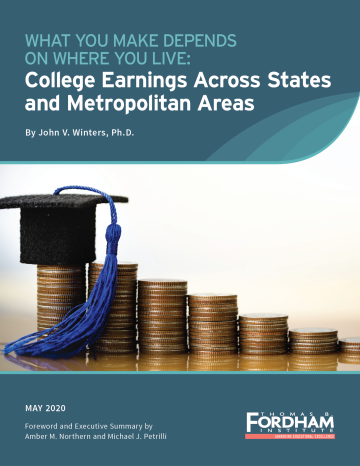
What You Make Depends on Where You Live: College Earnings Across States and Metropolitan Areas
Yes, what you make depends on what you know and what credentials you carry. But it also depends on where you live. That's what we find in our new report by John V. Winters. The first-of-its-kind analysis compares mean earnings for full-time workers with different levels of education in all 50 states and D.C., over 100 metro areas, and rural America. Read it to learn more.
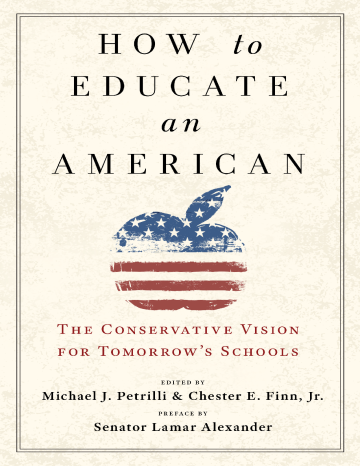
How to Educate an American: The Conservative Vision for Tomorrow's Schools
Featuring essays by twenty leading conservative thinkers, and anchored in tradition yet looking towards tomorrow, this book should be read by anyone concerned with teaching future generations to preserve the country’s heritage, embody its universal ethic, and pursue its founding ideals.
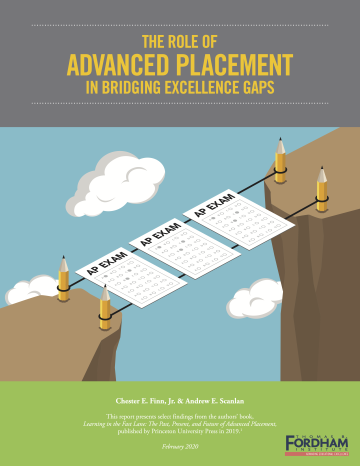
The Role of Advanced Placement in Bridging Excellence Gaps
This report presents key findings from Learning in the Fast Lane: The Past, Present, and Future of Advanced Placement, by Chester E. Finn, Jr. and Andrew E. Scanlan, and published by Princeton University Press in 2019.
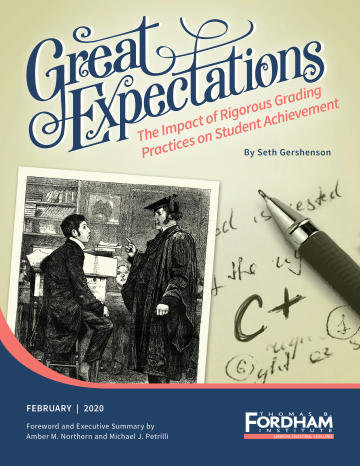
Great Expectations: The Impact of Rigorous Grading Practices on Student Achievement
One indicator of teachers’ expectations is their approach to grading—specifically, whether they subject students to more or less rigorous grading practices. Unfortunately, “grade inflation” is pervasive in U.S. high schools, as evidenced by rising GPAs even as SAT scores and other measures of academic performance have held stable or fallen. The result is that a “good” grade is no longer a clear marker of knowledge and skills. This report examines to what extent teachers’ grading standards affect student success.
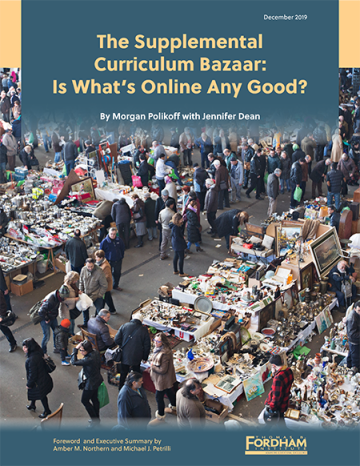
The Supplemental Curriculum Bazaar: Is What's Online Any Good?
Nearly all teachers today report using the Internet to obtain instructional materials, and many of them do so quite often. And while several organizations now offer impartial reviews of full curriculum products, very little is known about the content and quality of supplemental instructional materials.
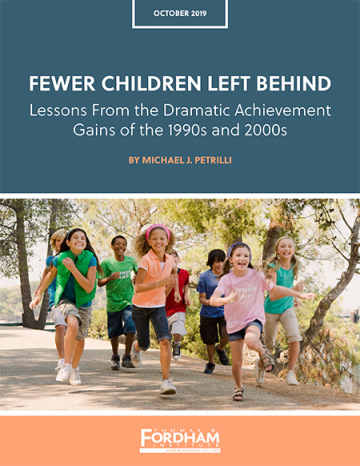
Fewer Children Left Behind: Lessons From the Dramatic Achievement Gains of the 1990s and 2000s
In this new monograph, Fewer Children Left Behind, Michael J. Petrilli, the president of the Thomas B. Fordham Institute, examines whether America’s schools have improved over the past quarter-century of reform.
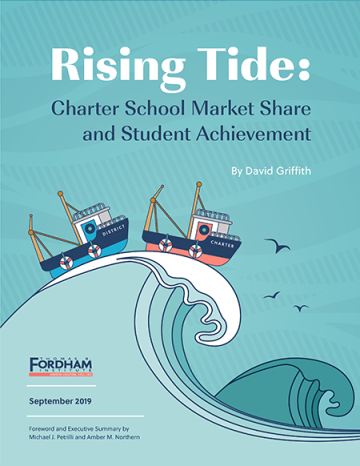
Rising Tide: Charter School Market Share and Student Achievement
Plenty of studies have compared the progress of students in charter schools versus traditional public schools. And more than a dozen have examined the “competitive effects” of charters on neighboring district schools.
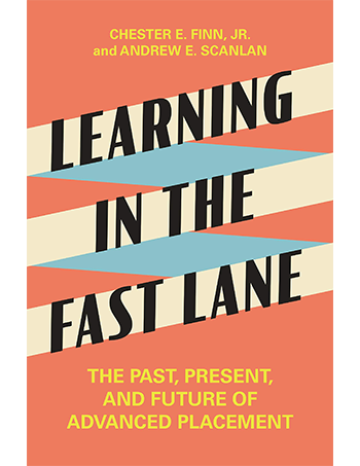
Learning in the Fast Lane: The Past, Present, and Future of Advanced Placement
Termed by the Washington Post’s Jay Mathews “the most comprehensive book on Advanced Placement, the most powerful educational tool in the country,” this book traces AP’s history from its mid-twentieth-century origins as a niche benefit for privileged students to its contemporary role as a vital springboard to college for high school students nationwide, including hundreds of thousands of poor and minority youngsters. It's a must-read for anyone with a stake in American K–12 education.
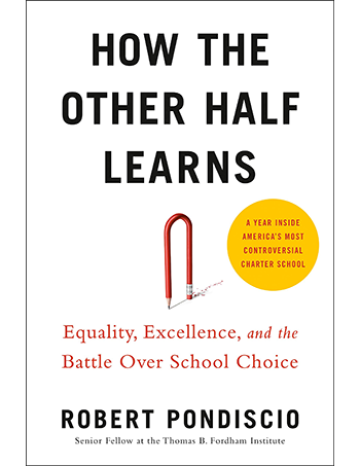
How the Other Half Learns: Equality, Excellence, and the Battle Over School Choice
Five years ago, in an op-ed in the New York Daily News, Fordham senior fellow Robert Pondiscio looked at yet another round of jaw-dropping tests scores achieved by Eva Moskowitz’s network of Success Academy charter schools and urged educators and
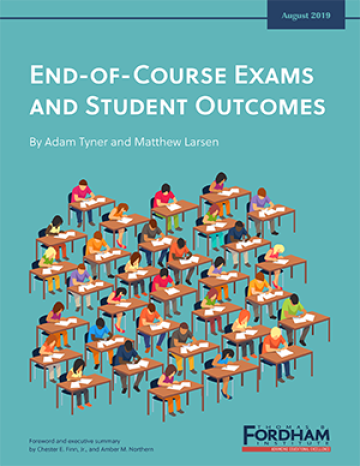
End-of-Course Exams and Student Outcomes
Beginning in the late 1990s, many states took it upon themselves to institute end-of-course exams (EOCs) at the high school level, tests specifically designed to assess students’ mastery of the content that various subject-matter courses covered. But was this testing policy good for students? Find out in our new report.
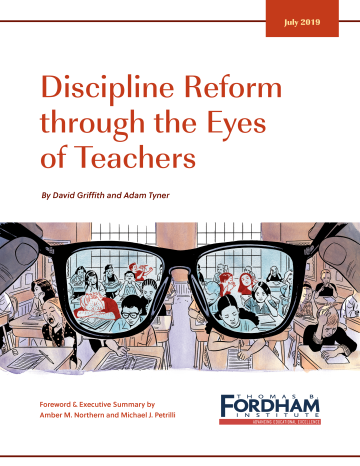
Discipline Reform through the Eyes of Teachers
The debate over school discipline reform is one of the most polarized in all of education. Advocates for reform believe that suspensions are racially biased and put students in a “school-to-prison pipeline.” Opponents worry that softer discipline approaches will make classrooms unruly, impeding efforts to help all students learn and narrow achievement gaps.
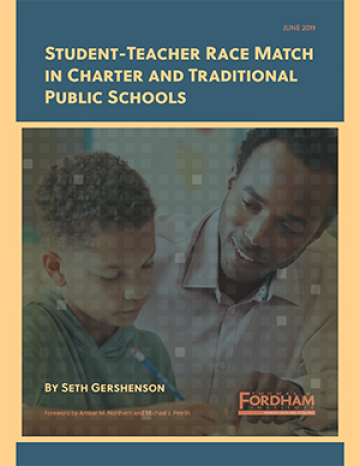
Student-Teacher Race Match in Charter and Traditional Public Schools
There’s mounting evidence that, for children of color especially, having one or more teachers of the same race over the course of students’ educational careers seems to make a positive difference. But to what extent, if any, do the benefits of having a same-race teacher vary by type of school? Existing “race-match” studies fail to distinguish among the traditional district and charter school sectors. This study fills that gap and finds that the effects of having a same-race teacher appear stronger in charter schools than in the traditional district sector—and stronger still for nonwhite students.